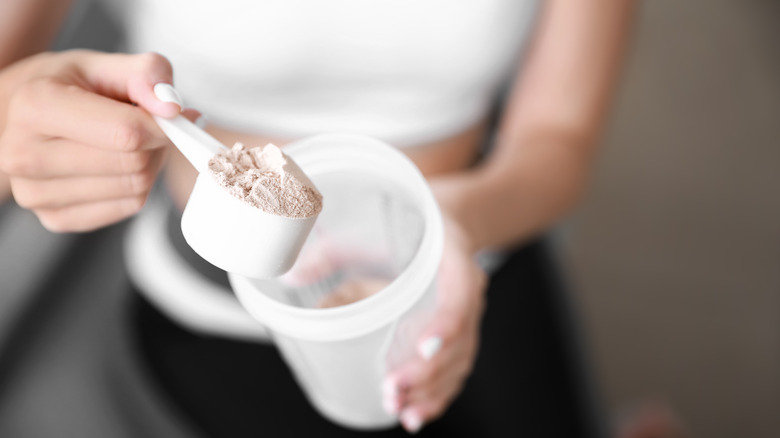Why Some Doctors Warn Against Using Meal Replacement Shakes
Meal replacement shakes sure have come a long way since the days of Slim-Fast. While so many people in the '80s relied on two shakes a sensible dinner for weight loss, grabbing a morning shake to start your day has almost become commonplace. Yet ironically, meal replacement shakes were actually originally created for hospital patients who couldn't eat (via HuffPost).
Now breakfast shakes are convenient for those who don't enjoy eating breakfast or simply can't get up early enough to have any time to make food before they leave the house. Picky eaters can also benefit from meal replacement shakes as well as those suffering side effects of medication, treatments, or illness, or pregnant people who are simply too nauseated to keep heavy food down (via WebMD). Shakes are also good when getting over an illness and for elderly who have sensitive stomachs, while a large majority of people use shakes to add protein to their diet.
Yet while these are some benefits to drinking a meal instead of eating it on a short-term basis, there can also be some drawbacks.
Meal replacement shakes should be temporary
Meal replacement shakes do supply nutrients when you can't eat regular food, but they should ideally be only for short-term use. When used as a temporary fix, they offer vitamins and minerals when food isn't a possibility. Yet no shake can fully replace whole foods. Registered dietician Amy K. Fischer says, "food first is always the best policy" (via Prevention). She advises using shakes only when necessary. "I would not recommend drinking more than one a day except if there is an underlying reason, like a medical prescription."
Also, a large portion of people who use shakes in place of food does so as a means to lose weight. When used only to drop pounds, you can miss out on learning how to incorporate sustainable and healthy eating habits in order to get regular and optimal nutrition that results in long-term weight loss, rather than just a quick fix. Long-term dieting has actually been known to be a cause of weight gain in the long run (via Eating Well).
"The severe restriction in calories can create unintended side effects, such as suboptimal intake of certain nutrients, slowed metabolism, and loss of connection with hunger or satiety signals," registered dietician Cara Harbstreet tells Eating Well. She adds, "The liquid nature of this diet also can remove fiber from one's diet, potentially altering gut health."
Supplementation may be necessary
The convenience of liquid meals is no match for the wholesome nutrients supplied in real food but a good shake can offer some nutrients. Dietician Nichola Ludlam-Raine tells LiveScience that meal replacement shakes can "provide carbohydrates for energy, protein for repair, healthy fats, and dietary fiber, as well as vitamins and minerals" but advises they "can often be expensive and may not be as filling as a meal that requires chewing." They can also cause constipation when first starting them.
When choosing a shake, it's also wise to consider that different bodies have different caloric needs. Ludlam-Raine warns that while "Some are what we call 'nutritionally complete' in a certain amount of shakes a day, meaning they are all you need to achieve recommended nutrient intakes", others need supplementing. She gives the example "if someone replaces breakfast and lunch with two shakes, they would have three snacks and one healthy evening meal."
While meal replacement shakes can be a nice supplement to your diet, the goal should be healthy, wholesome food first.


